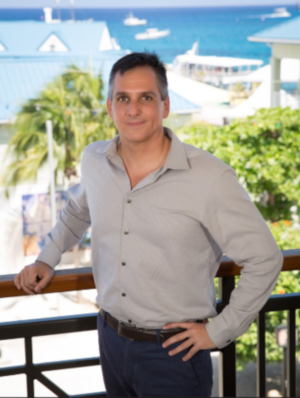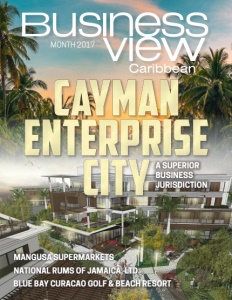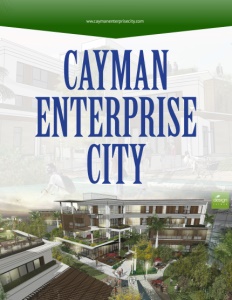Cayman Enterprise City
A superior business jurisdiction
Business View Caribbean interviews Charlie Kirkconnell, CEO of Cayman Enterprise City, as part of our focus on best business practices in the Cayman Islands.
For years, the two main economic drivers in the Cayman Islands were financial services and tourism – both of which took major hits in the wake of the global financial crisis that began in 2008. “One of the things that the government was looking to do, going forward, was to develop projects that would help to create some economic diversity in the Islands,” explains Charlie Kirkconnell, Chief Executive Officer of Cayman Enterprise City (CEC), a new business development project in the Caymans. “They were looking for additional ‘legs’ for the economy, so that, in the event of another global financial crisis, Cayman would be better able to cope with any fallout.”
The Cayman Enterprise City team approached the government with their proposal to build that diversity with a Special Economic Zone for knowledge and technology-based businesses who wished to establish a physical presence in the Islands. “We came along in early 2011 with our project, which was designed, primarily, to attract knowledge and technology-based businesses, to attract foreign direct investment, to create some economic diversity, and to introduce the new cutting-edge industries to the Islands’ economy, while creating knowledge transfer and jobs for Caymanians in the new industries.”

Charlie Kirkconnell, CEO
Worldwide, Kirkconnell notes that the competition for knowledge and technology-based businesses – what he describes as the industries of the future – is fierce. “The government recognized that if it wanted to attract businesses that the whole world is trying to attract, a very competitive set of concessions would need to be put together and offered to people who could choose to set up anywhere in the world. That is how our particular package of concessions emerged.”
In 2012, Cayman Enterprise City welcomed its first business to its Special Economic Zone, and today, there are 250 companies from over 20 countries situated in three special economic zones: Cayman Tech City, Cayman Commodities & Derivatives City, and Cayman Maritime & Aviation City, as well as four interim commercial buildings located around George Town. They all take advantage of CEC’s concessions package: 100 percent exemption from corporate, income, sales, and capital gains taxes, as well as import duties. Businesses have a 4-6 week fast-track set up for operations, and renewable five-year work/residency visas granted for staff from any county, within five working days.
But unlike companies that have traditionally utilized the Cayman’s favorable tax environment – the so-called “registered office” entities that may only have a name on a mailbox in some nondescript building – Cayman Enterprise City residents must have a genuine physical presence in the Islands and conduct substantial economic activity from their base there.
“In fact, prospective clients that are interested in just setting up a registered office here, and not having any sort of physical presence, don’t have a use for our product,” Kirkconnell explains. “Our product is a physical presence product and included in the business licensing process is the lease of commercial real estate within the Special Economic Zones. So, someone who doesn’t need that physical presence doesn’t need Cayman Enterprise City. None of our clients are without a physical presence – all of our clients have an office in the Islands and are conducting economic activity globally from within the jurisdiction.”
While another goal of the Special Economic Zones project is to advance the employment of native Caymanians, Kirkconnell concedes that there are still a few kinks to work out. “Given that these are new industries to the Cayman Islands, there is not any sort of critical mass of technically qualified people who can move into jobs like software development, and so on,” he admits. “There are some, and we do all we can to help connect qualified people with opportunities within Cayman’s Zones, but one of the issues that an emerging industry faces is that there is a shortage of qualified people for that industry; local people have not trained or acquired the qualifications because the jobs didn’t exist. So, one of our missions is to help develop that critical mass of technically qualified people.”
“So, we have our Enterprise Cayman Initiative,” Kirkconnell continues. “We get into the schools on a regular basis and speak with young kids about careers in technology; we update them on what’s happening in the Special Economic Zones and describe the careers that are becoming available in the Cayman Islands. If they want to live and work in the Cayman Islands, one of the decisions they have historically faced was the need to study something that’s either relevant to the financial services industry or the tourism industry. Our project is making a whole new set of careers available to people so that they can still choose to live and work in the Cayman Islands, but also pursue the career of their dreams.”
CEC also has a longstanding working partnership with the University College of the Cayman Islands. “For many years, they had what they called the STEM (Science, Technology, Engineering & Math) Ambassador Program, which was organized for students that were interested in pursuing careers in STEM disciplines,” Kirkconnell reports. “We got involved by arranging for some of our clients to speak to students about what they do, and how they ended up where they are today with a career in technology. We’ve also participated in their annual summer camp, again, designed to make young Caymanians aware of emerging careers in STEM disciplines. We’re very proud of our partnership with UCCI and look forward to developing it further in the years ahead.”
CEC is also in the process of launching the Cayman Code Academy. “This academy is for people who are interested in becoming programmers or coders,” says Kirkconnell. “They will be able to attend a vocational course here on the island that will teach them how to code with a view to enabling them to take entry level jobs in programming with companies in and outside of Cayman’s Zones. And the code academy will also offer advanced courses for those who have completed the first phase so they can continue their training. We are a licensee of a company called Code Fellows, which is a well-recognized coding academy based in the northwest U.S. We have access to their curriculum and to the industry intelligence that they have. As they update their curriculum, ours is updated, as well. We felt it was important not to try to build something from scratch, but to actually tap into something that has a track record of success in training people for careers in coding.
We also have an internship program that is currently in its 6th year. As schools break for the summer, our internship program will begin. It’s designed to match people who are qualified for jobs in the Special Economic Zones with available opportunities.”

“In fact, prospective clients that are interested in just setting up a registered office here, and not having any sort of physical presence, don’t have a use for our product,” Kirkconnell explains. “Our product is a physical presence product and included in the business licensing process is the lease of commercial real estate within the Special Economic Zones. So, someone who doesn’t need that physical presence doesn’t need Cayman Enterprise City. None of our clients are without a physical presence – all of our clients have an office in the Islands and are conducting economic activity globally from within the jurisdiction.”
While another goal of the Special Economic Zones project is to advance the employment of native Caymanians, Kirkconnell concedes that there are still a few kinks to work out. “Given that these are new industries to the Cayman Islands, there is not any sort of critical mass of technically qualified people who can move into jobs like software development, and so on,” he admits. “There are some, and we do all we can to help connect qualified people with opportunities within Cayman’s Zones, but one of the issues that an emerging industry faces is that there is a shortage of qualified people for that industry; local people have not trained or acquired the qualifications because the jobs didn’t exist. So, one of our missions is to help develop that critical mass of technically qualified people.”
“So, we have our Enterprise Cayman Initiative,” Kirkconnell continues. “We get into the schools on a regular basis and speak with young kids about careers in technology; we update them on what’s happening in the Special Economic Zones and describe the careers that are becoming available in the Cayman Islands. If they want to live and work in the Cayman Islands, one of the decisions they have historically faced was the need to study something that’s either relevant to the financial services industry or the tourism industry. Our project is making a whole new set of careers available to people so that they can still choose to live and work in the Cayman Islands, but also pursue the career of their dreams.”
CEC also has a longstanding working partnership with the University College of the Cayman Islands. “For many years, they had what they called the STEM (Science, Technology, Engineering & Math) Ambassador Program, which was organized for students that were interested in pursuing careers in STEM disciplines,” Kirkconnell reports. “We got involved by arranging for some of our clients to speak to students about what they do, and how they ended up where they are today with a career in technology. We’ve also participated in their annual summer camp, again, designed to make young Caymanians aware of emerging careers in STEM disciplines. We’re very proud of our partnership with UCCI and look forward to developing it further in the years ahead.”
CEC is also in the process of launching the Cayman Code Academy. “This academy is for people who are interested in becoming programmers or coders,” says Kirkconnell. “They will be able to attend a vocational course here on the island that will teach them how to code with a view to enabling them to take entry level jobs in programming with companies in and outside of Cayman’s Zones. And the code academy will also offer advanced courses for those who have completed the first phase so they can continue their training. We are a licensee of a company called Code Fellows, which is a well-recognized coding academy based in the northwest U.S. We have access to their curriculum and to the industry intelligence that they have. As they update their curriculum, ours is updated, as well. We felt it was important not to try to build something from scratch, but to actually tap into something that has a track record of success in training people for careers in coding.
We also have an internship program that is currently in its 6th year. As schools break for the summer, our internship program will begin. It’s designed to match people who are qualified for jobs in the Special Economic Zones with available opportunities.”
Check out this handpicked feature on Rosewood Little Dix Bay – British Virgin Islands.
AT A GLANCE
WHO: Cayman Enterprise City
WHAT: A privately owned development company in a special economic zone
WHERE: Grand Cayman, Cayman Islands
WEBSITE: www.caymanenterprisecity.com
PREFERRED VENDORS

Trident Properties – www.tridentproperties.ky
Trident Properties Cayman Islands Ltd. is a full-service real estate company located in George Town, Grand Cayman in the Cayman Islands, and the only real estate company dedicated to servicing the clients of Cayman Enterprise City. Trident Properties is locally owned and operated offering its customers intimate local knowledge of the Cayman Islands real estate market. Broker/Owner Kerri Kanuga has been a leading sales agent in the Cayman Islands market for over 15 years. Kerri’s numerous sales awards are a compelling demonstration of her knowledge and expertise in Cayman Islands real estate. Kerri is the Cayman Islands’ only Certified Luxury Home specialist, an accomplishment requiring exceptional knowledge, experience, and expertise in the luxury home market. Trident Properties is a proud member of the Cayman Islands Real Estate Brokers Association.

Appleby (Cayman) Ltd. – www.applebyglobal.com
With technological innovation transforming businesses, markets and our everyday life and with a burgeoning technology community in the Cayman Islands, Appleby’s Technology and Innovation Group supports clients across a broad range of emerging technologies. Our experts understand the opportunities these technologies can offer and can help navigate the regulatory complexities they bring with them.

International Management Services Ltd. – www.ims.ky
International Management Services Ltd is one of the oldest licensed financial service providers in the Cayman Islands (first licensed in 1974), has long been a pioneer in the world of offshore financial services and is now one of the leading fund governance and corporate service providers in the Cayman Islands.





